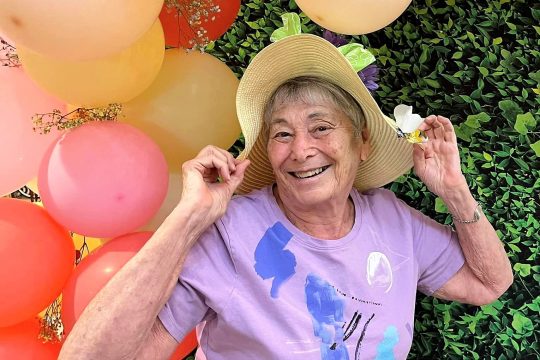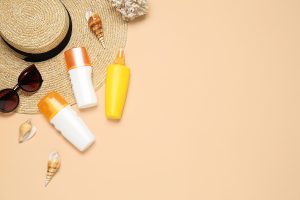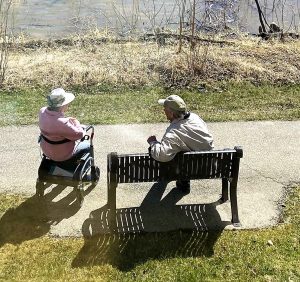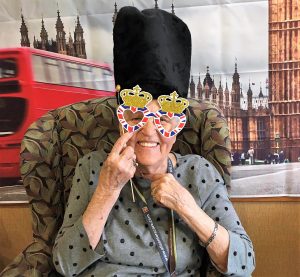
For many Canadians, the Victoria Day long weekend signals the beginning of the summer season. A time to indulge in outdoor activities, spend time with family and friends, and enjoy the warm weather.
It is also a great time to remind Canadians about sun safety and skin protection. While basking in the sun’s rays can feel great, it is important to protect your skin from its potentially damaging effects.
Sun Awareness Month and Older Adults
Sunlight has been linked to a range of health benefits, some of which are particularly important for seniors. The health benefits of sunlight include:
- Generating the production of vitamin D
- Supporting bone health
- Helping cognition
- Lowering blood pressure
- Disease prevention
- Promoting good mental health
- Improved sleep patterns.
Unfortunately, along with the benefits come some risks. In Canada, sunlight is strong enough to cause skin cancer, premature aging of the skin, and harm to the eyes.
May is National Sun Awareness Month and Skin Cancer Awareness Month. These campaigns aim to educate Canadians about sun exposure and how to keep themselves and their loved ones sun-safe.
How Older Adults Can Spend Time in the Sun, Safely
 In the 1950s and 60s sunblock or sunscreen were practically unknown. While it did exist, sun protection factor (SPF) hovered around two or four – a drastic difference from today’s minimum recommendation of 30. If anything, many people strived to get as tanned as they could – socially, it signaled health and vitality!
In the 1950s and 60s sunblock or sunscreen were practically unknown. While it did exist, sun protection factor (SPF) hovered around two or four – a drastic difference from today’s minimum recommendation of 30. If anything, many people strived to get as tanned as they could – socially, it signaled health and vitality!
Eventually, however, people came to realize that over exposure to sun had health consequences. For adults over the age of 65, the natural changes in our skin makes it more important than ever to practice sun-safety. Follow these tips.
1. Watch the UV Index
Regardless of the forecast, keep an eye on the UV Index and be sure to protect your skin when the UV Index is 3 or higher. Canada’s UV Index is highest between 11am and 3pm, so either keep out of the sun or limit your sun exposure during those times.
2. Seek Shade
The Canadian Cancer Society advises that, “if your shadow is shorter than you, find some shade”. When the sun’s rays are at their strongest, sit under a tree or awning, or use an umbrella for on-the-go protection.
3. Cover Up
Clothes protect your skin from the sun even better than sunscreen. Cover as much of your skin as possible by wearing clothing made from tightly woven fabrics. Or look for clothing that is labelled with a UPF (UV protection factor). The fabric is rated by the Skin Cancer Foundation according to the degree of protection it provides from the sun’s rays. Also, remember to wear a wide-brimmed had to protect your head, face, ears, and neck.
4. Wear broad-spectrum sunscreen
Use an SPF 30 or higher broad-spectrum sunscreen. Apply sunscreens liberally to all uncovered areas, including the nose, ears, hands, and feet. Remember to reapply every two hours. If you have sensitive skin, choose a mineral sunblock over a chemical UV blocker. See below for how to properly apply sunscreen.
5. Protect your eyes
Sunglasses are more than a fashion accessory. Choose sunglasses with UVA and UVB protection to help prevent skin cancer and vision loss from cataracts, or macular degeneration. Do not assume that dark tinted eyeglasses offer much more protection than another colored lens. Many eyeglasses that are lighter in color can also provide UV protection.
More Sun Safety Tips for Seniors
Be aware of medications that increase sun sensitivity. Certain prescription medications can make your skin more sensitive to ultraviolet light. Ask your doctor or pharmacist about possible sun-related side effects from your medications, including:
- antibiotics
- antifungals
- antihistamines
- cholesterol-lowering drugs
- diuretics
- non-steroidal anti-inflammatory drugs
Remember to do regular skin checks. Checking your skin regularly is important because early detection significantly reduces your risk of skin cancer – melanoma has a 90% cure rate if caught early. Follow this link and watch the video to learn how to conduct a self-examination, along with what to look for and when to see a dermatologist. It only takes 10-15 minutes, once a month. If you are a resident at All Seniors Care and want more information, speak to one of our caring staff and attend this month’s Healthy Living with Nurse – Check Your Skin seminar.
How To Properly Apply Sunscreen
 It’s best to apply sunscreen before you head outside—at least 15 to 20 minutes before sun exposure—because to be the most effective, it needs time to soak in. Reapply at least every 2 hours while you are outside, even on cloudy days.
It’s best to apply sunscreen before you head outside—at least 15 to 20 minutes before sun exposure—because to be the most effective, it needs time to soak in. Reapply at least every 2 hours while you are outside, even on cloudy days.
Look for a broad-spectrum sunscreen that protects against both UVA and UVB rays. UVB rays are the main cause of sunburns, skin aging, and skin cancer. The SPF should be at least 30.
Check the expiration date on your sunscreen. Most are good for three years, unless they’ve been exposed to heat fluctuations for long periods.
Read and follow the directions for the sunscreen being used. The most common mistake people make when using sunscreen is to not apply enough. According to Health Canada, it could take upwards of 7 teaspoons to fully cover exposed skin on the average adult:
- 1 teaspoon for each arm
- 1 teaspoon for each leg
- 1 teaspoon for your front
- 1 teaspoon for your back and
- 1 teaspoon for your face and neck
This rule applies regardless of what kind of sunscreen you use, be it chemical, mineral, or a combination formula.
Springtime at All Seniors Care
 Whether you prefer to relax on your private balcony or enjoy one of the many activities happening on our patios and beautiful outdoor spaces, we take your sun safety seriously. Our holistic approach to wellness includes teaching residents about self-care, and the necessary steps to ensure a healthy mind and body in all phases of their life.
Whether you prefer to relax on your private balcony or enjoy one of the many activities happening on our patios and beautiful outdoor spaces, we take your sun safety seriously. Our holistic approach to wellness includes teaching residents about self-care, and the necessary steps to ensure a healthy mind and body in all phases of their life.
Are you looking for a retirement home for yourself or your loved one? We offer independent living, assisted living, or memory care. We encourage you to tour our communities and experience the ways your life at an All Seniors Care Living Centre will be filled with compassionate care and meaningful connections. Ask for more details about our Hamilton senior home and other seniors residences near you.
More resource: www.skincancer.org/get-involved/skin-cancer-awareness-month/toolkit/
Writer – Julianna McLeod
Julianna is a health and wellness expert at All Seniors Care. Her mission is to create content that empowers seniors to form sustainable solutions for lasting health and happiness. She is an experienced writer, editor, and Recreational Therapist living in Toronto.
